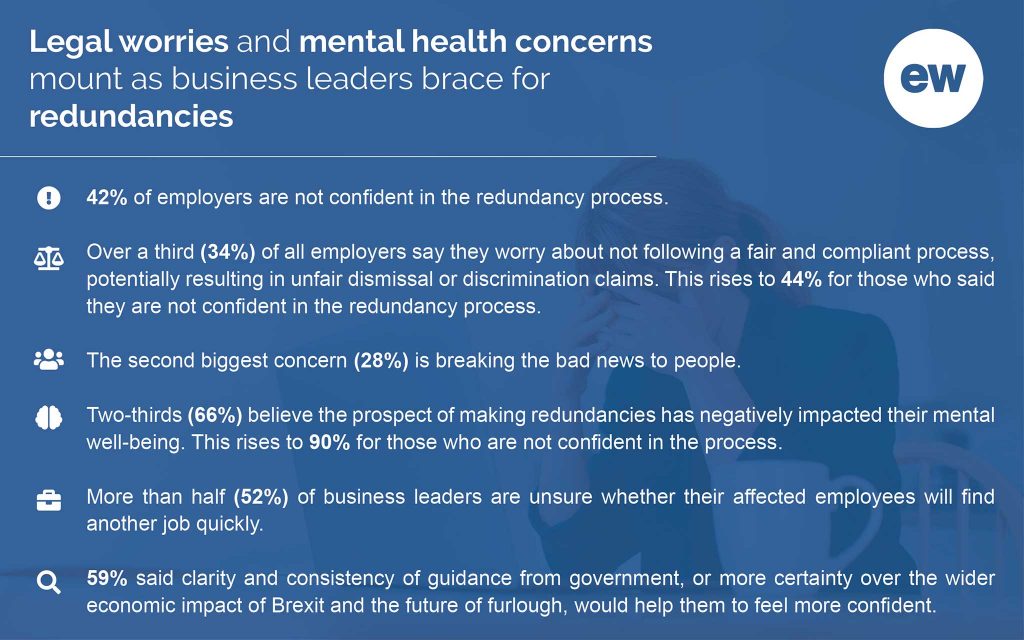BLOG
Legal worries and mental health concerns mount as business leaders brace for redundancies
- Employers’ greatest concern when making redundancies is the legal risk.
- Prospect of making redundancies has negatively impacted two-thirds of leaders’ mental wellbeing.
- No cost to employee to raise an Employment Tribunal claim.
Despite the last-minute extension of the furlough scheme, new research conducted among UK business leaders has revealed that great concern remains around making redundancies and in particular the legal risk.
Over a third (34%) say they worry about not following a fair and compliant process, potentially resulting in unfair dismissal or discrimination claims. This is greater than the 28% who said their biggest concern is breaking bad news to people and the personal impact on them.
The survey of over 440 UK business leaders, conducted by Employment Law and HR support firm Ellis Whittam, also found two-thirds (66%) believe the prospect of making redundancies has negatively impacted their mental wellbeing.
According to the Ministry of Justice, a big rise in Employment Tribunals is predicted once the furlough scheme ends. In recent official statistics showing Tribunal claims surged during the first lockdown period this year, they commented that: “This rise in employment receipts is likely to continue as the government’s job retention scheme comes to an end at the end of October.” While the furlough scheme has since been extended into the spring, it remains a difficult time ahead for many business leaders.
Employers potentially face a huge challenge, as since 2017, there has been no cost to the employee to raise a claim.
Related READING



Free Download: Business Leaders Redundancy Survey
Ellis Whittam surveyed 443 business leaders who have responsibility for employment and redundancy matters in their organisation to find out how managing the process has impacted them.
James Tamm, Director of Legal Services at Ellis Whittam, said: “In an environment where redundant employees don’t think they will get another job quickly, and in an increasingly litigious culture, employers are bound to face more and more time spent dealing with claims from employees that are trying to get money from every potential source. This stands to put even more stress on business leaders and their organisations.”
The research also found that more than half (52%) of business leaders are unsure whether their affected employees will find another job, given the state of the economy and how things are in their sector.
59% said clarity and consistency of guidance from government, or more certainty over the wider economic impact of Brexit and the future of furlough, would help them to feel more confident.
“Besides the tremendous difficulty redundancies will put on more households, we can’t forget this country’s SME business leaders, who are the lifeblood of so many industries,” added James Tamm.
“The UK economy is built on such companies and many of these leaders have strong personal ties to not only their business but also the people they employ and, in many cases, will now be having to make redundancies. With all the pressures of the current crisis we need these SME business leaders to lead the charge of recovery. We as a nation can’t afford for them to feel mentally jaded, yet two thirds of them are telling us that they are.”

Expert advice, guidance and reassurance
When it comes to redundancy, the right advice and support can make all the difference, giving managers the confidence they need to navigate the process, plus the reassurance of dramatically reduced legal risk.
To find out how Ellis Whittam’s highly-skilled Employment Law specialists can help you turn this complex exercise into a series of manageable steps and make the process as painless as possible, call 0345 226 8393 or find out more about our redundancy support.
Sign up for the latest news & insights
Resources
Latest News & Insights

Shoplifting and aggression | Keeping staff safe amid rising retail crime
BLOG Written by Theresa Lama-Cramp on 22 August 2025 Retail crime is on the rise, and pharmacies are among the hardest hit. According to a

The legal risks of ‘sandwich leave’
BLOG Written on 19 August 2025 It’s no secret that employees often try to optimise their annual leave, strategically booking time off around weekends or

What to do when an employee withdraws a grievance
BLOG Picture this: an employee submits a formal grievance about some aspect of their employment, but before you can act on it, they suddenly withdraw

HSE’s 2025 agenda | 7 highlights from its Annual General Meeting
BLOG Written on 8 August 2025 Now four years into its ambitious 10-year strategy, the HSE used this year’s Annual General Meeting (AGM) to clarify

Goodbye to gagging orders? | How amendments to the Employment Rights Bill could end NDA misuse
BLOG Written by Jane Hallas on 7 August 2025 Non-disclosure agreements (NDAs) – legal contracts used to prevent the sharing of certain information with others

5 ways summer can boost recruitment success
BLOG Written by Danielle Fargnoli-Read on 31 July 2025 Longer days, lighter moods, and a slower pace – summer in the UK offers a natural

Why probation still matters – even with day one rights delayed
BLOG Written by Richard Jay on 30 July 2025 Probationary periods remain a vital tool for employers to assess new hires, but upcoming changes to

Do ADHD and autism qualify as a disability? | Understanding the Equality Act 2010 and new case law
BLOG Written on 14 July 2025 When an employee discloses that they have ADHD or autism, many employers find themselves asking: Is this classed as

Privacy vs practicality | Are you entitled to know the reason for an employee’s sickness absence?
BLOG Written on 14 July 2025 When an employee calls in sick, it’s natural for employers to want to understand the situation. However, questions around
